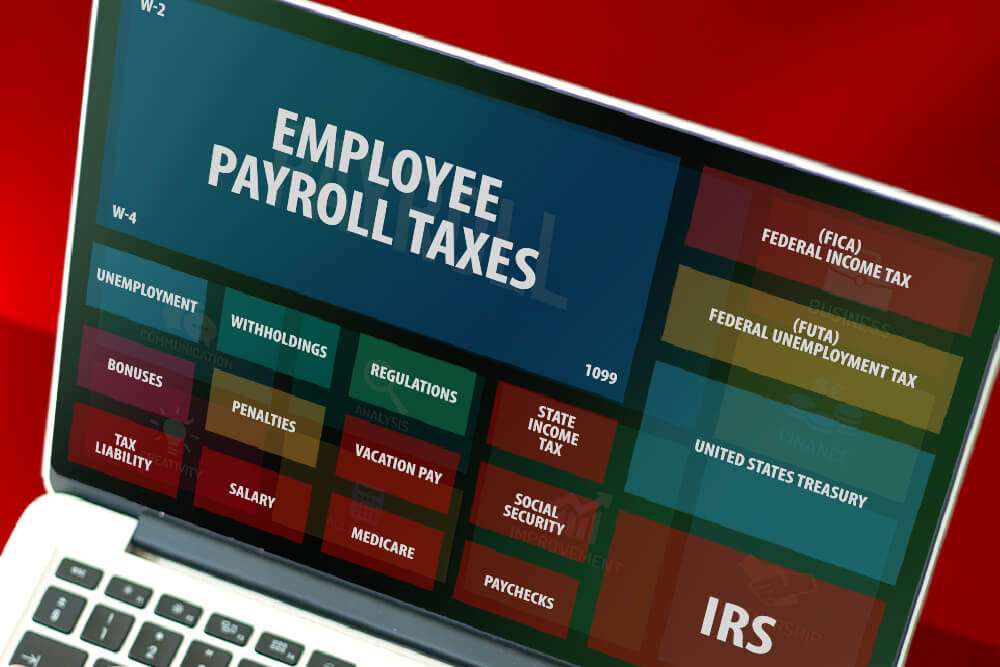Employee payroll taxes are a huge financial liability and major money management concern for businesses of all sizes and should not be taken lightly. From payday to tax time– managing employee wages, withholdings, filings, and payment deposits payments are governed by federal, state, and local labor laws. Employers are mandated to comply with stringent compliance regulations.
Processing payroll in-house without professional support is full of risks. This is a complicated process that is completely dependent on accurate calculations and filled with accounting traps that can wipe out your profits. It’s critical to keep accurate books, balanced reports, and stay up to date on tax laws and labor regulations.
Processing payroll & Employee Taxes Is A Heavy Expenditure
Federal payroll employee taxes collected by the Internal Revenue Service in 2019 topped $1.24 trillion. Virtually every small business owner, entrepreneur, and organization that employs hard-working Americans are required to record, withhold, file, and pay payroll taxes for their taxable employees.
Employee Payroll Taxes Are The Last Thing Entrepreneur’s Tackle
Despite the large part employee payroll taxes play in compensating employees and operating a business above the table, it’s possibly the last thing entrepreneurs address. Payroll processing software that is not set up correctly will be confusing, difficult to understand, and impossible to manage effectively. As a business owner, calculating what you owe, how, and when to pay is not by chance.
Why It’s Important To Manage Paying Employee Payroll Taxes
The safe answer is to keep the “Taxman” out of your pocket and we’re not referring to the famous Beatles’ song “Taxman” written by George Harrison, which recorded the international band paying more than 90% of their income to the Treasury.
Here’s the deal, unless you have deep pockets and don’t mind paying through the nose, hire Accounting & Management Company to set up, manage, and support your Accounting, Bookkeeping, and Payroll processing system with QuickBooks.
Outsourcing Payroll Provides Numerous Benefits
Most importantly, outsourcing Payroll provides a number of cost-saving benefits and can help keep your business off the IRS audit list by ensuring your employee payroll taxes are accurately recorded and paid on a timely basis.
QuickBooks links your books, general ledger, payroll, and bank accounts to provide a real-time look at your actual receivables, liabilities, expenses, and overall financial status. Additionally, it helps you control budgeting, so you don’t spend more than you make.
Employee Payroll Taxes Are Taxing
Let’s break it down so managing and processing employee payroll taxes are a bit less taxing. Worker’s withholding and filings are really controlling the flow of money through your business to your workers, and to appropriate tax authorities.
What Type Of Compensation Is Taxable
Classify and identify the type of compensation that is taxable in addition to wages and which types may reduce the taxable compensation. Pay extra attention to bonuses, tips, expenses, reimbursement, benefits, life and health insurance premiums, savings and retirement contributions, cashless payouts, and other difficult-to-track compensation because they’re often miscategorized.
Payroll Tax Withholdings
Employers withhold federal, state, and possibly local income taxes from their employee’s paychecks, and one-half of FICA taxes (Social Security and Medicare). In addition, employers are required to pay, from their own funds, the other half of FICA taxes, federal and state unemployment taxes, and possibly disability insurance taxes.
Employee withholdings and employer-mandated payroll taxes are required to be paid by the employer to the appropriate tax authorities.
Filings Dates, Deadlines, Payments, & Penalties
Pennsylvania business owners are required to record, withhold, file, and remit federal, state, and possible local, payroll taxes. Filing dates, deadlines, and payments differ. Unemployment taxes are reported and paid separately from income tax and FICA payments.
Get acquainted with these forms and get a thorough understanding of tax obligations, regulations, filing dates, deadlines, and penalties for employee payroll taxes.
Filings Dates, Deadlines, Payments, & Penalties
Pennsylvania business owners are required to record, withhold, file, and remit federal, state, and possible local, payroll taxes. Filing dates, deadlines, and payments differ. Unemployment taxes are reported and paid separately from income tax and FICA payments.
Get acquainted with these forms and get a thorough understanding of tax obligations, regulations, filing dates, deadlines, and penalties for employee payroll taxes.
Identify who your taxable workers are & What's your responsibility
Simple, if you have part-time or full-time employees that work remotely or onsite, as an employer you are responsible for withholding, paying, and reporting federal, state, and local employee payroll wage taxes to the appropriate authorities and or municipalities.
These are employee payroll taxes that individual workers’ pay on their wages. Businesses are required to withhold these taxes from part-time and full-time employee paychecks. Paycheck withholding taxes must be recorded, filed, and remitted to the appropriate authority and or municipality on behalf of the employee.
So, who is legally considered an employee and who isn’t? Think about it like this, if you have the right to direct and control the way a person does their work, rather than just the results of the work then that person is considered an employee.
Businesses and their owners are not required to pay taxes for non-employees. However, you must provide independent contractors, freelancers, and consultants, that work for your business and earn over the annual minimum an IRS 1099 form.
The IRS considers owners of Limited Liability Companies and S Corporations employees and is required to pay salary payroll taxes.
Federal, State, & Local Employee Payroll Taxes
Okay, now that we know who needs to pay employee payroll taxes and who doesn’t, let’s separate the taxes into three primary buckets, federal, state, and local.
Federal Income Tax & Employee Payroll Taxes
Federal income tax is considered withholding taxes. Federal Income Tax is collected entirely out of your employees’ wages.
Federal Insurance Contribution Act (FICA) Tax
FICA or Federal Insurance Contribution Act tax is a shared payroll tax. Employee and Employer each pay half toward Medicare and Social Security.
Federal Unemployment (FUTA) Tax
Employers pay Federal Unemployment tax (or FUTA). Currently, FUTA levies a federal tax rate of 6% on the first $7,000 paid to each employee annually. Employers may be eligible to reduce their employment tax liability up to 5.4% if they pay the full amount of unemployment taxes due on time.
State Income Tax & Employee Payroll Taxes
State income tax is a withholding tax that comes entirely from your employees’ pay. Pennsylvania employers are required to withhold personal income tax on resident employees at a flat rate of 3.07% on earned compensation. The taxation amount is based on the employee’s wages and claimed withholding preferences as filed on their Form W-4.
State Unemployment (SUTA) Tax
The Commonwealth of Pennsylvania (SUTA) tax is an unemployment payroll tax that employers are required to pay on behalf of their employees. PA’s current (SUTA) unemployment tax rate is 0.006% on employee gross wages. Employer withholding contributions are submitted to PA’s state unemployment fund with each quarterly report.
Local Taxes
Municipalities’ local payroll taxes are withholding taxes paid by employees and based on their earnings. Local tax rates can vary by type and amount depending on where you do business and where your employees pay their taxes.
Local taxes are due quarterly and commonly include Income, School board, Transit, and Municipality taxes.
Pay Up Or Pay Out
An intentional failure to over withhold or collect employee payroll taxes is a felony and punishable by thousands of dollars in restitution fines, criminal charges, and likely prison time, it’s smart business to learn more about Accounting & Management Company’s services and flexible support solution to help you manage paying your employee payroll taces. Remember, as your business grows so does your employment tax liability.
Contact us today and we’ll set up a scalable payroll system that deposits payroll taxes as employees get paid, activates filings, and remits payments, so you never have to be stressed out about falling behind or worried about not being unable to cover your tax liabilities when they come due.




